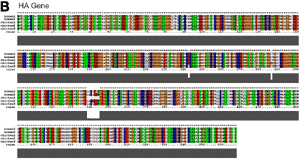Volume 10, Number 12—December 2004
Dispatch
Novel Avian Influenza H7N3 Strain Outbreak, British Columbia
Figure A2

Figure A2. Phylogenetic tree of isolates described in the text with 65 full-length H7 HA gene segments present in GenBank. The tree was generated with nucleotide sequences by the neighbor-joining method in Bonsai (1.1.4.) (http://calliope.gs.washington.edu/software/). Corrected distance estimate is indicated by the scale bar. The H7N3 avian influenza isolates reported in this article are at the bottom of the tree.
Page created: October 26, 2024
Page updated: October 26, 2024
Page reviewed: October 26, 2024
The conclusions, findings, and opinions expressed by authors contributing to this journal do not necessarily reflect the official position of the U.S. Department of Health and Human Services, the Public Health Service, the Centers for Disease Control and Prevention, or the authors' affiliated institutions. Use of trade names is for identification only and does not imply endorsement by any of the groups named above.